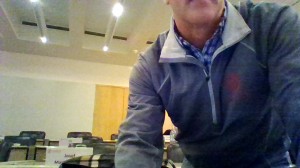 My friend, a high-level manager at a financial services firm, confided he felt as if he were leading a double-life. Not in a sordid, creepy way, involving drugs or scandal or Liza Minnelli cabaret impersonations by night. Rather, he complained that his “work” persona and his “home” persona had grown distinctly separate over the years, and it made him sad.
My friend, a high-level manager at a financial services firm, confided he felt as if he were leading a double-life. Not in a sordid, creepy way, involving drugs or scandal or Liza Minnelli cabaret impersonations by night. Rather, he complained that his “work” persona and his “home” persona had grown distinctly separate over the years, and it made him sad.
I suppose it’s a common ailment among up and coming managers as they learn the corporate game—how to play the part in order to live up to the expectations of the new role.
At least it was true for me, especially during those early clawing-my-way-up-the-corporate-ladder years. I was just being careful, though, skirting around my own immaturity. Mostly because I didn’t think my employers would be so happy if they knew the truth about me—the real, dope-head, goofball me, who mysteriously, accidentally, somehow got promoted to a management position. “What were these people thinking? How did I ever get hired at this level? What will they do if they find out how incapable I really am?” These were the self-sabotaging thoughts battering my little head while trying to do my job.
It is a well-known fact that most new leaders experience what is known as the Imposter Syndrome, where high achievers worry they’ve fooled people into believing they are more competent than they really are. Managers typically cope by covering up their insecurities, either through avoiding tough questions or pretending they know more than they do. Either way, it takes the focus off bringing their skills and talents to the job…and puts it instead on the impression they are making.
James Hacket, CEO of the office furniture behemoth Steelcase, talks about his own difficulty coming to grips with his leadership identity early in the job, until a fateful meeting with Bill Marriott (CEO of Marriott Hotels) turned him around.
“I had been struggling … What does a C.E.O. look like and feel like?” he asks. “What’s the texture of what you’re supposed to be? And I understood from seeing Bill Marriott’s eyes that you have to be who you are.”
This, paradoxically, is the most counter-intuitive advice imaginable for managers worried about being found out. But think about the relief of becoming your complete self upon entering the office tomorrow morning! No more posing. No more pretending to have all the answers.
There is this person deep inside you who has been long forgotten. It’s your true self, the child full of wonder, the hero flying through the sky. Here, in this grounded place, is where you will be most effective. You can’t lead, transform, or touch the lives of others when you are faking it.
Perhaps you have lost that person somewhere along the process of forging a path to your grown-up life. That true self has been chipped away little by little as you tried to meet everyone else’s expectations of what you thought you were supposed to be.
“I’ve met just about every C.E.O. who runs a big company,” James Hacket continues. “The ones I’m most impressed with do not seem packaged. But they have this sense of peace, this self-awareness, that says, ‘I understand who I am.’”
Listen, everyone knows you’re not perfect. We all have weaknesses and blind spots. It’s what makes you real. As my wife frequently reminds me, “You’re not fooling anyone, so why pretend?”
The truth is, you are fearfully and wonderfully made, and all those experiences and lessons and unique traits of yours add up to a formidable presence that is unmatched. So let go of the posturing, the pretending of what you will never be. Reclaim your irreplaceable self.
The truest is the you-est, that’s what I say.
And what a relief it will be to everyone who finds you there












